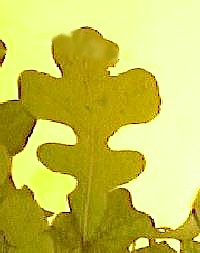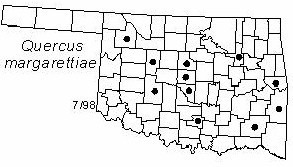
Shrub, often clonal and spreading by long rhizomes (runners). Bark light gray, fissured, scaly. Leaves variable in size and shape, 4-10 cm (1.6-4 in) long, broadly or narrowly obovate, usually 5-lobed with the upper pair of lobes broad and blunt, glabrous above and brownish-downy below. Stellate hairs are present on the lower surface of leaves and on the young twigs. Acorn cup deeply saucer-shaped and fine-scaled, about 1/3 to 1/2 as high as the ovoid acorn.
Distribution: Native in scattered locations in eastern U. S. as far north as New York and as far west as Oklahoma.
Habitat: sandy soil
Comment: This species is similar to Q. stellata and is often treated as a variety. The only consistent differences seem to be the shrub growth form and smaller leaves of Q. margarettiae. Quercus is the ancient classical name for the European oaks; margarettiae was named by W. W. Ashe for Margaret Wilcox, who later became Mrs. Ashe.
NWI status: none
Distribution in Oklahoma:

BACK
NEXT
RETURN TO INDEX
Last update: 9/16/99
 Go to Oklahoma Biological Survey Home Page
Go to Oklahoma Biological Survey Home Page
 Disclaimer
Disclaimer